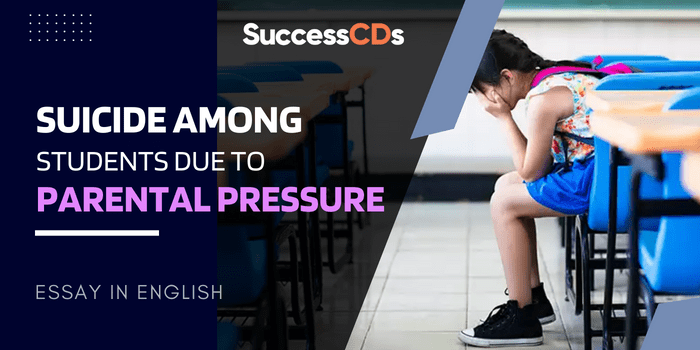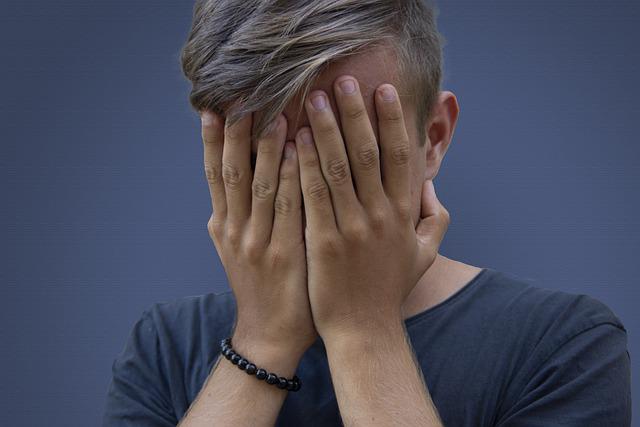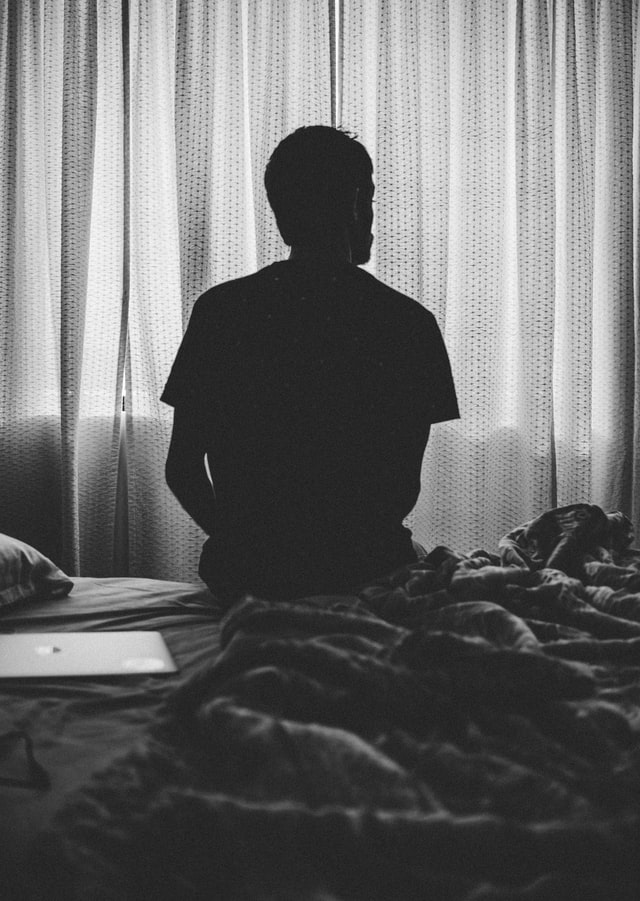
Suicide among Students – Parental pressure is something that a majority of people experience during their academic life. While parental pressure works great for a student’s academic performance, there are also certain circumstances where parents’ high expectations take a huge toll on their children’s mental health. Due to extreme parental pressure, getting good grades becomes extremely necessary for a student. And failure to meet such parental expectations often leads to a youngster developing a negative perception of life. According to a 2017 research paper, this situation gradually drives the youngsters to despair and turns them suicidal. Many research studies have claimed that parental pressure is one of the leading causes of increasing rates of student suicides in India. In the last few years, a large number of Indian students have committed suicide due to parental pressure and the unavailability of proper psychological counseling.
We live in a society where academic excellence is considered a matter of pride. Students with poor academic performances often experience brutal criticism from their parents, teachers, and relatives. It eventually develops self-doubts in them regarding their intelligence and capabilities. Because of the ever-competitive society, most parents constantly push youngsters to build a bright future. Many mental health professionals believe that this excessive academic pressure on students limits their psychological growth and causes anxiety and depression. In worst cases, extreme harsh criticism by the parents results in youngsters committing suicide. Psychiatrists argue that parents can play a pivotal role in mitigating the stress students experience due to extreme mental pressure. As students spend most of their time at school, teachers can also help their students reduce academic performance-related stress. Before elaborating on the details, let’s understand what parental pressure is.
- What is Parental Pressure?
- Parental Pressure – A major cause of stress among students
- How parental pressure makes a student suicidal?
- Effects of parental pressure on students
- Statistics of student suicides in India
- How can parents help students eliminate suicidal thoughts (Do’s & Don’ts for parents)
- Friendly parenting is the key

What is Parental Pressure?
Parental pressure is a type of emotional stress that a student experiences when their parents impose extreme mental pressure on them, usually regarding their academic performance. In simple words, parental pressure is a kind of emotional burden on a child that they have to perform well in studies, or otherwise, they may experience harsh criticism and humiliation from their parents, relatives, or even teachers. Such pressure may come from the good intentions of the parents. But it can adversely affect a child’s self-confidence, self-esteem, academic performance, and even psychological well-being. Researchers have argued that psychological pressure imposed by a family member can be extremely harmful to a child’s mental health.
Parental pressure is often related to the following areas:
- Academic performance
- Physical appearance
- Performance in extracurricular activities
- Social interactions
- Social or cultural standards
- Friendship or any romantic relationship
Parental Pressure – A major cause of stress among students
A child’s future is one of the biggest concerns for any parent, especially in Indian society. The society we live in often sets high standards for the youngsters to match up. In Indian society, parents decide on their children’s professions even before the children’s birth. Children are expected to become engineers, doctors, professors, or high-positioned government employees without being asked about their dreams and choices. It is the common story of every Indian household where children always struggle to fulfill the high demands of their parents. When the expectations increase day by day, it develops a kind of fear and anxiety in the child. The child may experience extreme stress and can be diagnosed with anxiety disorders or depression.
In 2020, three private and three government schools in Kolkata conducted a mental health survey on 190 students (Class 11 and 12). According to the survey result, two-thirds of students experienced parental pressure regarding their academic performance. The students shared how they experienced harsh criticism from their parents and relatives when they didn’t get good grades in school examinations. A few among them even shared their experience of facing humiliation from their school teachers when they didn’t perform well in academics. They also revealed how their parents forced them to join extracurricular activities when they had no interest in joining. On the other hand, a recent 2021 research paper has claimed that most parents pressure their children regarding studies, intending to pay more attention to them. Parents who grew up with negligent parents tend to put pressure on their own children. Additionally, the guilt of big life disruptions like divorce often makes the parents more worried about their children’s future. They fear being neglectful towards their children and often overcompensate by putting unnecessary pressure.
In our country, the authorities of educational institutes are obsessed with the idea of bright students matching up to their high standards. To maintain their high reputation, they create extreme psychological pressure on their students that they have to perform well in the examinations. The teachers continue to make the students understand the importance of good grades without being concerned about what the students are learning. Similarly, parents are more concerned about what their relatives will say if their children fail to get good grades. And the whole process of pressurizing a student regarding their academic performance revolves around it. In this process, parents and teachers ignore that their actions and high expectations might cause the students to experience psychological stress. They almost forget to check on the youngsters if they are doing good or not.
Top
How parental pressure makes a student suicidal?
Nowadays, children live in a hyper-competitive world where perfectionism is the only key to achieving success in life. Children are taught that success only means excellent professional performance, higher status, and an eye-catching appearance. Such lessons adversely affect a student’s perspective about success. In such situations, youngsters become more vulnerable to failure and start having self-harming tendencies when meeting failure. Apart from suicidal tendencies, a student can develop bipolar disorder, behavioral disorders, anxiety disorder, depression, and other serious mental health consequences after experiencing extreme parental pressure. A World Health Organization (WHO) report claimed that one in every seven students aged between 10-19 years in the world experiences depression during their academic years. The number accounts for 13% of the global burden of mental health diseases. It made another shocking revelation that every hour, a student commits suicide in India due to parental pressure. According to the report, suicide is considered the fourth leading cause of death among students aged between 15-19 years.
When asked, many mental health therapists have shared their experience of dealing with students with suicidal tendencies. The therapists revealed that many parents humiliate their children in front of others when they fail to get good grades in school. Many parents even threaten their children that they will be sent to hostels if they don’t perform well in their studies. Parents may think that scolding or threatening will make their children concentrate more on their studies. But unfortunately, this is not the reality. Experiencing constant humiliation from their parents often works as a trigger, and it can gradually drive them to suicide. According to psychiatrists, another major cause of suicide among students is- the level of mental tolerance has exceptionally come down among youngsters. Low mental tolerance has made them more vulnerable to criticism. As a result, they often refuse to accept failure and struggle a lot while handling emotional ups and downs.

Top
Effects of parental pressure on students
Excessive parental pressure often results in the child developing several mental health disorders, including depression. When a child feels abandoned by their parents because of their poor performance in studies, it can affect them in many ways. In worst cases, a child may commit suicide. When we think about such incidents from our adult perspective, we may find the reason for committing suicide very immature. But, a child can feel socially isolated even within their homes due to harsh parenting, which can lead to them trying to harm themselves without thinking about the consequences. A 2015 study explained that children growing up with parents who often yelled, humiliated, shouted, or behaved badly with them are more likely to develop depression symptoms and suicidal thoughts.
The following are some negative effects of parental pressure on children:
1. Suicidal tendencies
In India, suicide is unnaturally common among students due to parental pressure. Psychiatrists believe that many students choose to commit suicide when they fail to meet the supremely high parental expectations regarding their academic performance. Self-harming tendencies are very common among teens who fail to deal with the mental pressure imposed by their parents and relatives.
2. Prone to psychological issues
Living under constant pressure can have several negative impacts on a child. Studies say that children who experience brutal criticism and high amounts of stress when they don’t get good grades in their studies are prone to mental health diseases. If unnoticed, the children can develop major depression or other mental health disorders without knowing how to deal with them.
3. Depression and anxiety
Many studies have found an important link between experiencing harsh criticism from parents and developing major depression symptoms. When a child receives critical language from their parents, they also engage in negative self-talk.
4. Eating disorders
There is evidence that children often use food as a coping technique to deal with psychological stress imposed by a family member. And as a result, they develop eating disorders and eventually struggle with poor body image.
5. Low self-esteem
Many times unnecessary comparisons with others work as a trigger for the children. Many parents have a habit of comparing their children with their peers resulting in the children experiencing low self-esteem. They start self-doubting their capabilities, and it can affect their professional performance.
6. Poor academic performance
Negative parenting and harsh behavior can cause poor performance of the children in studies. Researchers explained that children with authoritative parents work less hard in school and have less interest in improving themselves.
Other negative effects of parental pressure on children:
- Anger-management issues
- Struggles maintaining relationships
- Risk of physical injuries due to excessive engagement in sports-related activities
- Negative behavioral changes
Statistics of student suicides in India
According to recent data by the National Crime Records Bureau (NCRB), nearly 12,526 students in India committed suicide between 2019-2021. The data reveals that the rates of student suicide have increased by almost 21.19% since 2019. The data claims that approximately 1.8 lakh students in India have committed suicide since 1995. An NCRB survey reveals that most students decide to end their lives due to failure in examinations and parental pressure. Student suicide has become one of the most crucial issues in India in the last decade. Experts argue that the majority of the Indian population who committed suicide were aged between 15-29 years. Nearly 53% of the total suicide cases were from Jharkhand, Maharashtra, Odisha, Karnataka, Tamil Nadu, and Madhya Pradesh. The COVID-19 outbreak, followed by the nationwide lockdown and school closures has worsened the situation. India records the highest number of student suicide in 2020 amid the outbreak of COVID-19.
Top
How can parents help students eliminate suicidal thoughts (Do’s & Don’ts for parents)
Most parents impose unnecessary pressure on their children regarding their studies and unknowingly push them towards serious consequences. It is high time that parents should take responsibility for the trauma their children experience because of extreme parental pressure. If expert opinions are believed, parents can play a pivotal role in mitigating the stress among their children. They can positively help their children eliminate negative thoughts and suicidal tendencies. The following are some guidelines parents should follow while handling a child who is struggling with stress or related issues.
- Firstly, educate your child about the importance of time management. It will not only help your child improve in studies but also reduce their study-related stress.
- Never compare your child’s capability with their peers or friends. Constant comparison often develops self-doubts in children. They may experience low self-esteem and poor self-confidence issues which will negatively affect their future performances.
- If your child performs poorly in examinations, try to encourage them by saying that they will perform well in the future if they work hard.
- Motivate your children to spend time with their friends, have social interactions, and play outdoor games in nature. Spending time in nature helps a person reduce stress and anxiety.
- Don’t burden your child by putting too much study-related pressure on them. Preparing a daily schedule for your child will help them to become organized.
- Always acknowledge and celebrate your children’s little efforts and victories. It will keep them motivated to work hard.
- Before deciding their future, ask your children about their dreams, what they want to become or what subject they want to pursue in the future. It will make them feel important and mattered.
- Never say to your children that they cannot do anything. Parents’ belief in their children is the major key to success for the children.
- Create a friendly environment within the house so that your children can share their feelings, thoughts, and opinions with you without any hesitation.
- Share your childhood stories with your children. It will surely strengthen your bond.
- Don’t be concerned about what others will say about your children if they fail to perform well in their studies. Motivate your children as much as you can.
- Encourage good lifestyle habits and positive thinking practices in your children. Encourage them to practice mindfulness, meditation, or yoga at home.
- Teach your children about the importance of healthy eating and sleeping habits. A positive lifestyle can help eliminate the negative thoughts in your children’s minds.
- If your child suffers from any kind of fear or anxiety, talk to them immediately about the concern.
- If you notice any behavioral changes or psychological issues in your child, consult with a therapist as soon as possible. Neglecting such issues can develop more serious concerns in the future.
Friendly parenting is the key
Every parent wants the best for their children. But they should also know that there is a fine line between caring and caring too much. Extreme worry and concern can adversely affect a child’s mental health. Parental pressure can result in a child developing serious psychological disorders, including depression and bipolar disorder. It can even develop suicidal thoughts and self-harming tendencies in a child. When a child struggles a lot while dealing with internal vulnerabilities, they often choose to end their life. Thus, parents should prevent themselves from putting extreme pressure on their children, having high expectations of them, and harshly criticizing them if they don’t get good grades in studies.
Top
Recommended Read
- Essays in English
- Essay on My Father in English
- Essay on Mahatma Gandhi in English
- Essay on Swami Vivekanand in English
- Essay on Shaheed Bhagat Singh in English
- India’s 15th President Draupadi Murmu, Essay in English
- Essay on Cruelty to Animals in English
- Essay on Importance of English
- Plastic ban – Are we doing enough?
- Essay on my family
- Essay on My best friend
- Essay on Impact of Poverty on Education
- Essay on The Wonder Called Science in English
- Essay on Mobile Phones in English
- Agnipath – A New Recruitment Scheme of Indian Armed Forces
- Role of Technology in Education? English Essay
- What is Exam Result Anxiety and How to Reduce it
- Should Facebook be banned? English Essay
- Suicide Among Students Due to Parental Pressure
- Should selling and using tobacco be banned? English Essay
- Social Media – A cause of Anxiety and Depression
- Should Smoking in Public Places be banned? English Essay
- Essay on Should children get limited access to the Internet?
- Should Education be Free? English Essay
- Coronavirus: Coping With Viruses in the 21st Century: Are we ready?
- To Zoom or Not to Zoom – Is it Safe for Official meetings in 2020?
- Online Education : A Boon or A Curse?
- Citizenship Amendment Act – Confusion and Arguments Explained
- Merger of Banks in India – What are the advantages and disadvantages?
- Essay on why plastic has been banned in India for students
- Impact of COVID-19 on the World Economy
- The Impact of COVID-19 on Global Education and its Solution
- Essay on the importance of Computers in our life
- Essay on Importance of Discipline for success in life
- Essay on Terrorism
- Essay on Skill India Mission
- Essay on Renewable Sources of Energy
- Essay on Make in India Project
- Essay on Haritha Haram Program
- Essay on Corruption
- Ten tips on writing a good essay
- Essay on “My Aim in Life – to become an astronaut”
- Essay on the Importance of Education
- Essay on Beti Bachao, Beti Padhao
- Essay on Importance of sports and games
- Essay on Demonetization
- Essay on Pollution
- Essay on Water conservation
- Essay on Global Warming
- Essay on Diwali in English
- Essay on Holi in English
- Essay on Chandrayaan in English
- Essay on Women Empowerment in English
- Essay on Child labour in English
- Essay on Swachh Bharat Mission
- Contributions of DRDO in Indian Defence